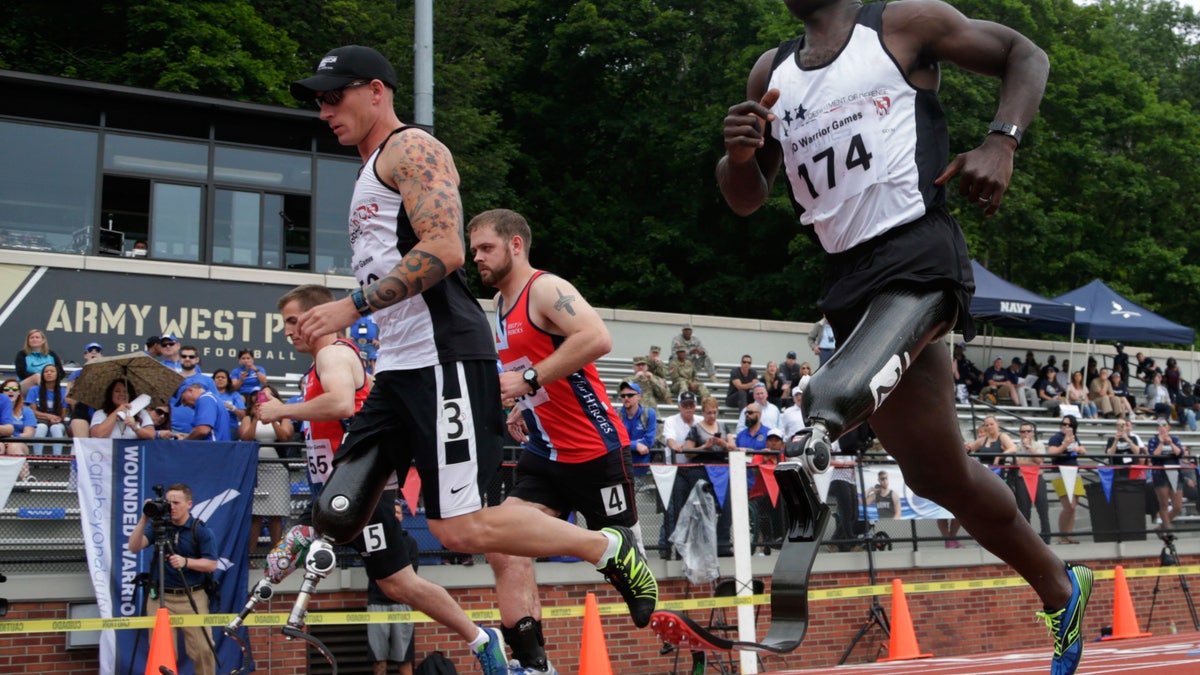
In this Thursday, June 16, 2016 photo, William Reynolds, right, a 2002 graduate of the U.S. Military Academy, competes in the 800-meter race at the Warrior Games in West Point, N.Y. Reynolds said his training and discipline are the same as when he was a competitive gymnast as a West Point cadet. The big adjustment was learning to run when he didnât have the sensation of his left foot hitting the ground anymore. (AP Photo/Mike Groll) (Copyright 2016 The Associated Press. All rights reserved. This material may not be published, broadcast, rewritten or redistribu)
WEST POINT, N.Y. (AP) -- William Reynolds breezed past the finish line first in his 100-meter race at West Point, down the hill from where he once marched as a cadet and a dozen years since the attack in Iraq that cost him part of his left leg.
Reynolds, 35, is a competitor in the Warrior Games, the military's annual adaptive sports competition, held this year through Tuesday at the U.S. Military Academy. For Reynolds, the games rekindle the sense of camaraderie he felt before the 2004 roadside bomb attack in Baghdad. And running full-out with a prosthetic sends a positive message to the soldiers he patrolled with as a young Army officer, he said.
"They put me in a medevac vehicle, and the last time they saw me, they didn't know if I was going to live or not," Reynolds said between races. "And for them to fast-forward 10 years and I'm out here running again, almost as fast as I could with two legs, competing at a high level and I'm physically fit, I think that's really mentally healing for them to see that I've made it through and I've battled back."
The Warrior Games are run by the Department of Defense for injured or ill service members and veterans. Athletes who lost limbs compete against others with cancer or traumatic brain injuries. Some 270 athletes have been competing at West Point since last week in events including cycling, archery and wheelchair basketball.
The competition was a homecoming for Reynolds, who graduated from the academy in 2002.
He said his training and discipline are the same as when he was a competitive gymnast as a West Point cadet. The big adjustment was learning to run when he didn't have the sensation of his left foot hitting the ground anymore. Though doctors tried for years to save his leg, it was amputated above the knee in 2013.
Reynolds retired from the Army in 2007 and works as a consultant in Bethesda, Maryland. He brought his wife and four young children to West Point to watch him win several races Thursday. He also has competed in the Invictus Games, an international competition similar to the Warrior Games.
Reynolds sees racing as just another of the milestones he began aiming for in his hospital bed at Walter Reed Army Medical Center, starting with learning to walk again.
"I left my infantry career in the military much earlier than I thought I was going to be leaving it," he said. "Being part of Warrior Games, that gives you an opportunity to be part of a unit and be a part of a team again, which is something that had been kind of ripped away from all of us prematurely."
Col. Chris Toner, commander of Army Warrior Transition Command, said the games provide a "stepping stone" for those heading back into the force or into civilian life. Plus, it allows them to showcase their abilities and to compete.
"These service members they are competitive by heart, all of them are," Toner said.
Army Sgt. Maj. Jerry Hochstedler, 56, said the competition helped him set goals again after being shot in the arm in Afghanistan in 2009 and enduring 27 surgeries. He always had a competitive spirit, even if it meant walking an extra 10 feet down a hallway at Walter Reed. Now he focuses it on a bike.
"Yeah, I'm in a race with other people. But I'm in a race against myself," he said. "I'm not in a race to defeat; I'm not concerned about that. I'm in a race to make sure that I'm doing the best that I can."
